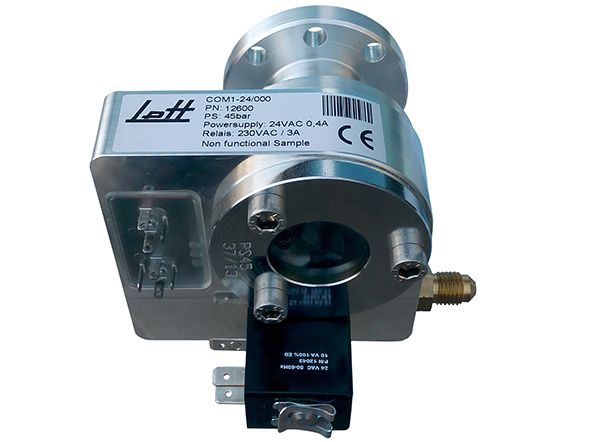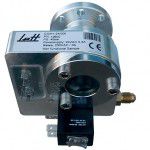OIL LEVEL CONTROL
- model :
- Lett Electronic Oil Level Controller
Description
Adequate oil level is an important requirement for long life of the compressor. Depending on the system design (eg in rack applications) the correct oil level control under different operating conditions is possible only using an active regulation system. The passive systems are problematic because they only operate satisfactorily under constant operating conditions, but due to seasonal variations this is not possible.
Product Description
| COM1 Oil Management:
The electronic oil level regulation system with alarm function and compressor shut-down.
|
Product highlights: • Sophisticated operating principle, stand-alone controller for Oil supply with oil level sensor and solenoid valve • Optimized energy consumption by special Design of Solenoid Valve and Coil • High-precision sensor technology allows a very precise level detection • Float calibrated for POE Lubricants • No incorrect measurements by foaming oil or incidence of light • Conforms to CE, Gost • Protection class IP 54 , electrical connection with molded plugs and cable • Easy to fit to existing oil sight glass connection |
Technical Data
| CE mark in compliance with Low-Voltage Directive, EMC Directive | 2006 / 95 / EC 2004 / 108 / EC |
Time delay | Alarm: 90 s Fill: 10 s |
| Applicable standards | EN 12284, EN 378, EN 61010-1:2010, EN 61326, EN 61000-6-2:2005, EN 61000-6- 3:2007 + A1:2011 |
Alarm contact | max. 3A, 230V AC, floating |
| Pressure rating: | Max. operating pressure PS 45 bar Test pressure PT 50 bar Burst pressure: 225 bar |
Media Compatibility |
HFC, CO2, mineral, synthetic and ester oil, other refrigerants on request. |
| Power supply voltage, Current | COM1-24: 24VAC, 50/60Hz, +10/-15%, 0,4 A COM1-230: 230VAC, 50/60Hz +10/-15%, 0,04 A |
Materials | Housing and Adapter (EN AW 6081, 6082) Oil Conn.: CW617N Sight Glass: 11SMnPb37 Screws: stainless steel |
| Vibration resistance | max. 4g, 10… 250Hz, (EN 60068-2-6) |
Protection class |
IP 54 (IEC529 / EN 60529) |
| MOPD solenoid valve | 24 bar | Oil connection |
7/16”-20 UNF male |
| Media/Storage temperature: Ambient temperature: | -40 … 80°C -40 … 50°C (static) |
Description
Adequate oil level is an important requirement for long life of the compressor. Depending on the system design (eg in rack applications) the correct oil level control under different operating conditions is possible only using an active regulation system. The passive systems are problematic because they only operate satisfactorily under constant operating conditions, but due to seasonal variations this is not possible.
Variations in operating conditions and defrost cycles may be covered by an active oil regulation, ensuring reliable operation. Active systems monitor the oil level in compressors and generate an alarm for low oil level. Even without built-in compressor oil pump and oil differential pressure switch (for example, scroll compressor), the oil supply to the compressor can only be monitored with an active control.
A Hall sensor and a built-in magnet in the float system measure the oil level in the compressor. Depending on the oil level and the consequent changes in magnetic field strength results in a variable voltage induced into the Sensor. This is evaluated by an electronic unit and accordingly, the LED’s and the solenoid valve will be actuated. If the oil level is in the Alarm Range (see Operation), the COM1 switches with a delay time of 90 seconds the relays contact into the alarm state. This signal can be used to shut down the compressor or for data processing. During the alarm condition oil is permanently fed in the compressor, with the target to bring the oil level to normal. If successful, the alarm is reset.
Operation
The oil sight glass is divided into ranges:
Normal Oil Level: 40-60% sight glass height
Critical Oil Level: 25-40% sight glass height and
Alarm Level: from <25% sight glass height.
If the green LED is on the COM1 is in operation and the oil level is within normal range. If the oil level for longer than 10 seconds is below the normal range, the solenoid valve is switched on, so that oil can be filled up to 60% sight glass height (maximum filling height). The valve closes again. The time delay of 10 seconds may be useful for certain types of compressors and applications since during the start of the compressor oil level varies and without a delay the filling of oil would start although enough Oil is present. With this delay an overfilling of the compressor can be avoided.
If the oil level in a low pressure system in spite of active oil filling moves into the “critical area”, this could be a result of a compressor throwing more Oil into the system than the COM1 can re-fill. In such a case, the differential pressure (oil pressure minus suction pressure) has to be increased to such an extent that sufficient oil can flow back. This can be achieved by the use of ORV valve that is available with 1,5, 3 and 5bar differential pressure.
To avoid oil shortage LETT Controls recommends to leave the COM1 in operation even during compressor is in off condition.
The LED’s and their meaning for the operating condition




